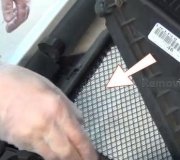It's hard to say definitely if a burned up coil was caused by the high system voltage. Logic would dictate other damage should have occurred too. Another possibility is the coil was getting ready to fail, and the high voltage just hurried things up a little.
Just to clarify, is it the ignition coil that burned up or some other component? Eight coils-on-plug are only used on the 4.7L engine, so I'm guessing that's what you have.
Once the Check Engine light turned on, there was a diagnostic fault code stored in the Engine Computer's memory. There are two possible codes. The computer can detect incorrect current going to one coil and set a code for that, or it can detect a specific cylinder misfire. There might also be a code for "field current not switching properly". That would be for the charging system problem.
There are a number of things that can cause the charging voltage to go to 18 volts. A shorted voltage regulator inside the Engine Computer is one possibility, but there are so many safeguards built in that it doesn't happen very often. Since the problem occurred again with the replacement computer, the voltage regulator can be ruled out.
In very rare instances one of the small terminals on the back of the alternator can become grounded, but that won't happen on its own. It would happen when replacing the alternator but would also be very unusual.
The most likely suspect is the dark green wire between the alternator and Engine Computer becoming shorted to ground. That will cause the alternator to charge wide-open. One thing that suggests this might not be the problem here is the voltage only went to 18 volts, (or was that the assumption because that's the highest the gauge reads?). Grounding this wire is a test mechanics use to determine if the cause of a no-charge condition is the fault of the alternator or the regulator. When grounding this wire, system voltage typically goes to 16 - 18 volts at idle, but it is very important that if it does, you must not raise engine speed. At higher rpm, alternators can reach as high as 35 volts. On older cars, that would pop any light bulbs that were turned on. On newer cars and trucks, various computers would be damaged before the voltage got that high. By driving the truck for ten miles with high system voltage, regardless if the battery was disconnected or not, things should have been "exploding".
The fact more things weren't damaged suggests system voltage didn't go catastrophically high. That would lead to another possibility; a break in the system voltage sensing wire going to the Engine Computer. If it's broken or corroded, there's no telling what voltage that wire will "float" to and be seen by the regulator.
Double-check the battery cables and connections. Besides the overcharging, loose or corroded cables will cause the original failure to crank. The only other cause would be a discharged battery which will not occur if overcharging is the only problem.
If the system continues to intermittently overcharge, connect a wire to the alternator that you can run inside the truck to monitor with a cheap digital voltmeter while you're driving. Both small terminals will only have voltage for one second after turning on the ignition switch, then they will go to 0 volts. The voltage will come back when the engine is rotating, (cranking or running). One terminal on the alternator will have full battery voltage. You must connect to the other one. This terminal must never have 0 volts, but the lower it is, the harder the alternator is working.
When the problem occurs, observe the voltage on that wire. 0 volts indicates that wire is being grounded somewhere. Look for electrical harnesses drapped over sharp metal brackets or laying on hot exhaust parts.
If you find around 4.0 volts on the wire, suspect a problem with the voltage sensing wire. The most the voltage regulator can do is draw this wire down to around 4.0 volts.
Caradiodoc
Friday, March 12th, 2010 AT 8:06 PM


